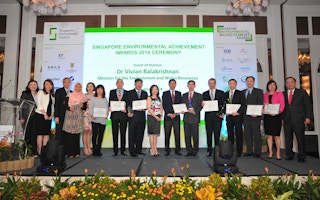Glaxo Wellcome Manufacturing and Grand Hyatt Hotel’s investments in new energy saving technology paid off in a major way, winning them the topmost awards at the Singapore Environmental Achievement Awards (SEAA) 2014.
To continue reading, subscribe to Eco‑Business.
There's something for everyone. We offer a range of subscription plans.
- Access our stories and receive our Insights Weekly newsletter with the free EB Member plan.
- Unlock unlimited access to our content and archive with EB Circle.
- Publish your content with EB Premium.
About 200 guests from the government, industry and non profit sectors attended the awards, which were organised by the Singapore Environment Council (SEC) and held at the InterContinental Hotel. SEC received 19 applications from organisations in Singapore and the region. A panel of experts selected eight winners across six categories, including manufacturing, services, technological innovation, and public sector administration.
The top award of the evening, the SEC-CDL Outstanding Environmental Achievement Award, went to Glaxo Wellcome Manufacturing (Glaxo), a subsidiary of global pharmaceutical giant GlaxoSmithKline.
The medical goods company, who also won in the manufacturing category, was commended for their commitment to safeguarding the health of the environment. With a pledge to be carbon neutral by 2050 and a vision to develop the ‘Sustainable Factory of the Future’, they have implemented more than 50 sustainability initiatives to meet these goals since 2011, and saved S$1.3 million in the process.
The most noteworthy of the company’s efforts to shrink their carbon footprint, reduce water usage and minimise waste was an integrated waste heat and solvent recovery system installed at its pharmaceutical ingredients factory, which is located in Singapore’s Pioneer industrial district.
The system is installed in the factory’s waste treatment plant, and designed to recover the solvent chemicals used to manufacture pharmaceutical ingredients; these are then reused in the manufacturing process. The solvents that are not recovered proceed to the incineration plant, where the system also captures the heat generated from the burning process. This recaptured energy is used to generate the steam that provides heat for chemical reactions, and to power the facility’s chillers as well.
GSK estimates that this system, together with other energy efficiency efforts such as installing solar panels on the factory roof and appointing energy efficiency committees within the company will reduce the facility’s energy use by up to 7 per cent every year, even as production increases.
Lim Hock Heng, Glaxo’s vice president and managing director, said that winning the SEAA’s Manufacturing and Outstanding categories was a “huge milestone” in their sustainability journey. “We are glad for this endorsement of our efforts, and the encouragement it provides,” he added.
Meanwhile, the Grand Hyatt won the SEC-Senoko Energy Green Innovation Award after developing and installing a $4.8 million trigeneration plant in their hotel, which takes in coal gas and simultaneously generates steam, power, and helps dehumidify outdoor air before it enters the hotel’s cooling system. The steam is used in the hotel’s laundry operations, while the energy generated by the trigeneration plant powers various fixtures around the hotel.
“
We have seen a marked increase in the sophistication of applicants, whose novel and beneficial solutions will serve as an inspiration to others in the private and public sectors.
Jose Raymond, chief executive officer, Singapore Environment Council
Grand Hyatt developed the system together with students from the National University of Singapore, and also holds a joint patent with the University for a “Desiccant Dehumidifier” technology used in the hotel’s cooling system. This passes air over silica gel before it enters the hotel’s cooling and ventilation system.
This dehumidified air requires less energy to cool down, and Grand Hyatt estimates that the trigeneration system will eliminate 60,000 litres of diesel and help the hotel reduce 720 metric tonnes of carbon dioxide emissions. It will also help the hotel produce 30 per cent of its own electricity.
Other winners at the SEAA included Novotel Singapore Clarke Quay, who won in the services category, and Holy Innocents’ Primary School, who picked up a merit award for the public sector category.
Jose Raymond, SEC chief executive, said that “the strong attraction of the SEAA to global powerhouses is testament to [SEC’s] prestige as the leading environmental award in the industry.”
He added that over the award’s 17 years, there had been “a marked increase in the sophistication of applicants, whose novel and beneficial solutions will serve as an inspiration to others in the private and public sectors.”
SEC also launched a training and education programme at the event, which will reach out to businesses and students to advance their knowledge of sustainable issues such as recycling, waste and water management, and energy efficiency. SEC will work with industry and academic experts to conduct courses and workshops for clients, and also develop a set of educational materials that companies can use to build capabilities amongst their staff.
While the cost of these courses has not yet been determined, SEC is working closely with the Singapore Workforce Development Agency to have courses certified under the national Workforce Skills Qualification system, so that up to 90 per cent of the cost can be subsidised by the agency.
“Cost should not be a factor for companies that are interested in learning more about sustainability,” said Raymond.










